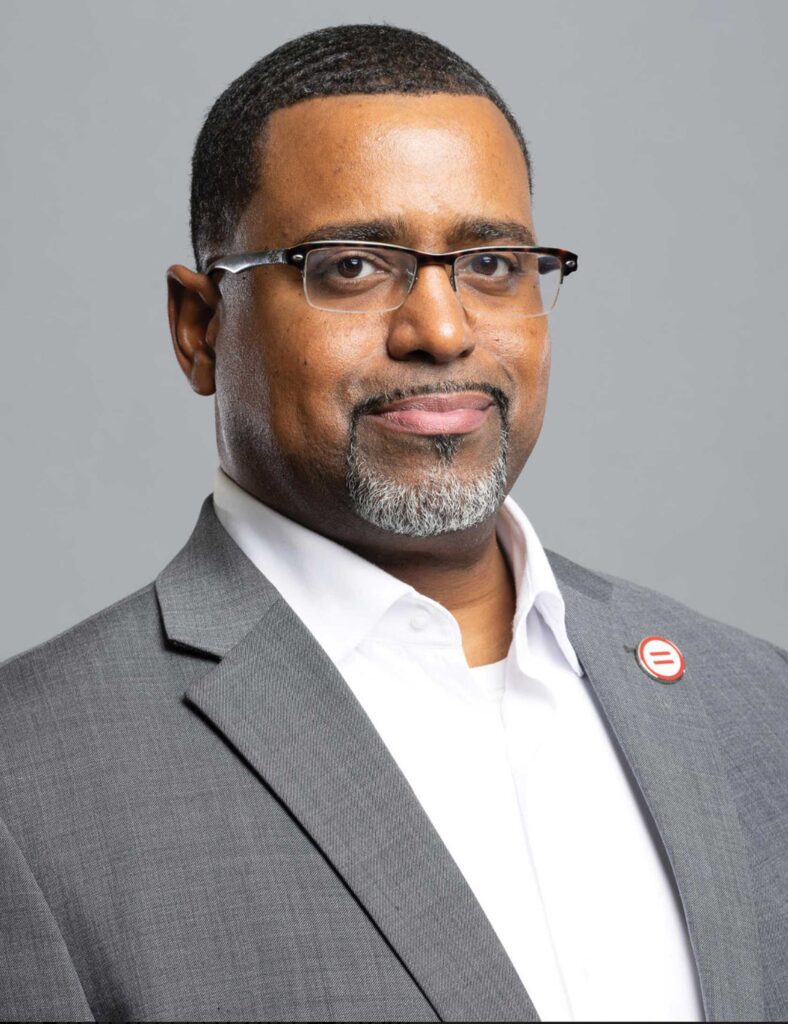Hall goes from advocate to executive at local Urban League
Former civil rights lawyer ‘building out’ education, workforce programs

For the past year, Rahsaan D. Hall has been transitioning from advocating for people whose civil rights have been violated to overseeing social services designed to uplift the region’s Black residents as president and CEO of the Urban League of Eastern Massachusetts.
Hall’s move from civil rights lawyer to nonprofit executive, starting a year ago June 5, has presented a challenge in how he is seen and what he has time to do.
“I think one of the challenges has been getting past my prior identity,” Hall said in a telephone interview. “When I was at the Lawyers Committee [for Civil Rights] or the ACLU, if there were issues that were happening in the community, folks would look to me or look to those organizations for advocacy. Because that’s not who the Urban League has historically been, it’s been a challenge to balance what I say ‘yes’ to.”
Joseph Feaster, who chaired the Urban League board when Hall was hired, is also a lawyer. Josh Kraft, president of the New England Patriots Foundation, replaced Feaster as chairman in February.
“I’ve been a lawyer that’s been a manager a number of times,” Feaster noted. “Back in the day, most CEOs of major corporations were lawyers…Lawyers can manage.”
It’s not the first time a lawyer has led the local affiliate, which was established in 1919. Its first executive was Matthew W. Bullock, a graduate of Harvard Law School who went on to a long career in state government. “He was a pretty impressive individual,” Hall said.
So far Hall, 51, has managed the competing demands on his time, energy and attention and said he has launched more than a half dozen initiatives “building out” the civil rights organization’s work on its five pillars: employment, education, health, housing and justice.
One issue in Brockton, where he lives, did pull first him and then the Urban League into advocacy on an issue. That was a call from some school committee members to bring the Massachusetts National Guard to quell student fights that stemmed from staff shortages, resulting in inadequate adult supervision of 3,000 students at Brockton High School. Brockton activists and the Urban League opposed the move to deploy the military, which Governor Maura Healy did not do.
But Hall has had to limit how often he goes all-in when issues arise, given the organization’s lean staff of nine.
“I’m being mindful about how we use our resources, because when I think about advocacy, that means coalition-building, that means community engagement, and so I’ve pulled back on that to some degree,” he said.
Hall listed expansions of the organization’s services, or planned ones, so far under his watch:
• Adding cybersecurity training, in partnership with the nonprofit CyberTrust Massachusetts, to its Msimbo Coding Academy, which draws its name from a Swahili word that means code.
• Pursuing a grant to provide career exploration and awareness of the clean energy and climate tech fields. “There are more jobs coming online in that sector, and we want to make sure that those opportunities are available to people in our community,” Hall said. “So that’s one direction we’re really going to be leaning into.”
• Partnering with Franklin Cummings Institute of Technology to create a scholarship for survivors of domestic violence to obtain a certificate in construction, software development, electric vehicles or heating, ventilation and air conditioning.
• Aligning its science, engineering, technology and math program for middle and high school students with the National Urban League’s Project Ready, a college and career readiness program.
• Seeking a grant, with Northeastern University School of Law, to connect formerly incarcerated people to training and employment opportunities through state-funded but little-known Community Justice Centers around the state.
• Launching a drive to connect Black males with mental health services and recruit Black men to become providers of such services.
• Joining the steering committee of the Massachusetts Election Modernization Coalition, which works on ballot access and election administration, to push for same day voter registration.
Hall noted the Urban League of Eastern Massachusetts is working across its five pillars but “to be effective in all those areas takes resources and capacity.”
To that end, the organization has set a goal to increase its fundraising. Last month, the Whitney M. Young Giving Circle was created to cultivate individual donors who can give from $500 to $5,000 over three years.
“We are making inroads into the private sector to get sponsorships for our events, identifying opportunities for partnerships with our workforce development programs and also cultivating individual donors who work at these corporations,” Hall said.The organization is also planning a drive to increase its membership.
“We’re not like the NAACP, where we are a membership-based and -driven organization. But we do have memberships available,” he said. “They’re $75 annually.”
Members, he explained, work through the organization’s Young Professionals Network or Guild, its fundraising arm.
Hall’s move to the Urban League of Eastern Massachusetts came after Keith Motley served as interim president and CEO for three years. The former chancellor of the UMass Boston cochaired the search committee that recommended Hall, who credited his predecessor with stabilizing the organization and steering it through the pandemic.
“I think he’s the perfect person to take it to another level,” Motley said, calling Hall “a bridge between generations” experienced in community and political relations.
For his part, Hall said: “I feel like I got here at the right time to do that, and blessed the patient was turned over to me in the condition that it is in so we can do this work. I feel good about where we are but better about where we are headed.”






